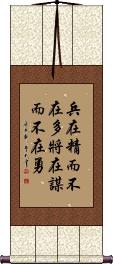Many custom options...
And formats...

Value in Chinese / Japanese...
Buy a Value calligraphy wall scroll here!
Personalize your custom “Value” project by clicking the button next to your favorite “Value” title below...
Switched to secondary search mode due to lack of results using primary.
These secondary results may not be very accurate. Try a different but similar meaning word or phrase for better results. Or...
Look up Value in my Japanese Kanji & Chinese Character Dictionary(My dictionary is a different system then the calligraphy search you just tried)
If you want a special phrase, word, title, name, or proverb, feel free to contact me, and I will translate your custom calligraphy idea for you.
Value of Warrior Generals
兵在精而不在多將在謀而不在勇 is a proverb that informs how it is better to have warriors of quality, rather than just a large quantity of warriors in your army/force.
This literally means: [Just as] warriors [are valued for their] quality and not [just] for quantity, [so] generals [are valued] for their tactics, not [just] for [their] bravery.
See Also: 兵在精而不在多
The Value of Warriors Lies in Their Quality
This literally means: [The value of] soldiers/warriors lies in [their] quality.
兵在精 is part of a longer phrase that ends with “not [just] in [their] quantity.”
兵在精 is a well-known phrase in military circles, so the second part is suggested when one hears or reads these three characters.
See Also: 兵在精而不在多
These search terms might be related to Value:
A House Might Be Worth 1 Million Dollars, but Good Neighbors Are Worth 10 Million
Cherish
Idea / Thought / Meaning
Love and Respect
Love and Respect / Kindness and Respect
Love Loyalty Respect
Mutual Respect
Precious / Treasure
Price
Protect Guard Treasure Cherish
Respect
Respect / Honor / Esteem
Respect and Loyalty
Respect Out of Fear is Never Genuine; Reverence Out of Respect is Never False
Respect, Honor, Truth
Self-Respect / Self-Esteem
Sun Tzu: Regard Your Soldiers as Children
The Key to Immortality is First Living a Life Worth Remembering
Treasure
Warriors: Quality Over Quantity
Words Have Enormous Weight: One Word Worth Nine Caldrons
The following table may be helpful for those studying Chinese or Japanese...
| Title | Characters | Romaji (Romanized Japanese) | Various forms of Romanized Chinese | |
| Value of Warrior Generals | 兵在精而不在多將在謀而不在勇 兵在精而不在多将在谋而不在勇 | bīng zài jīng ér bú zài duō jiàng zài móu ér bú zài yǒng bing1 zai4 jing1 er2 bu2 zai4 duo1 jiang4 zai4 mou2 er2 bu2 zai4 yong3 bing zai jing er bu zai duo jiang zai mou er bu zai yong | ping tsai ching erh pu tsai to chiang tsai mou erh pu tsai yung | |
| The Value of Warriors Lies in Their Quality | 兵在精 | bīng zài jīng bing1 zai4 jing1 bing zai jing bingzaijing | ping tsai ching pingtsaiching |
|
| In some entries above you will see that characters have different versions above and below a line. In these cases, the characters above the line are Traditional Chinese, while the ones below are Simplified Chinese. | ||||
Successful Chinese Character and Japanese Kanji calligraphy searches within the last few hours...





